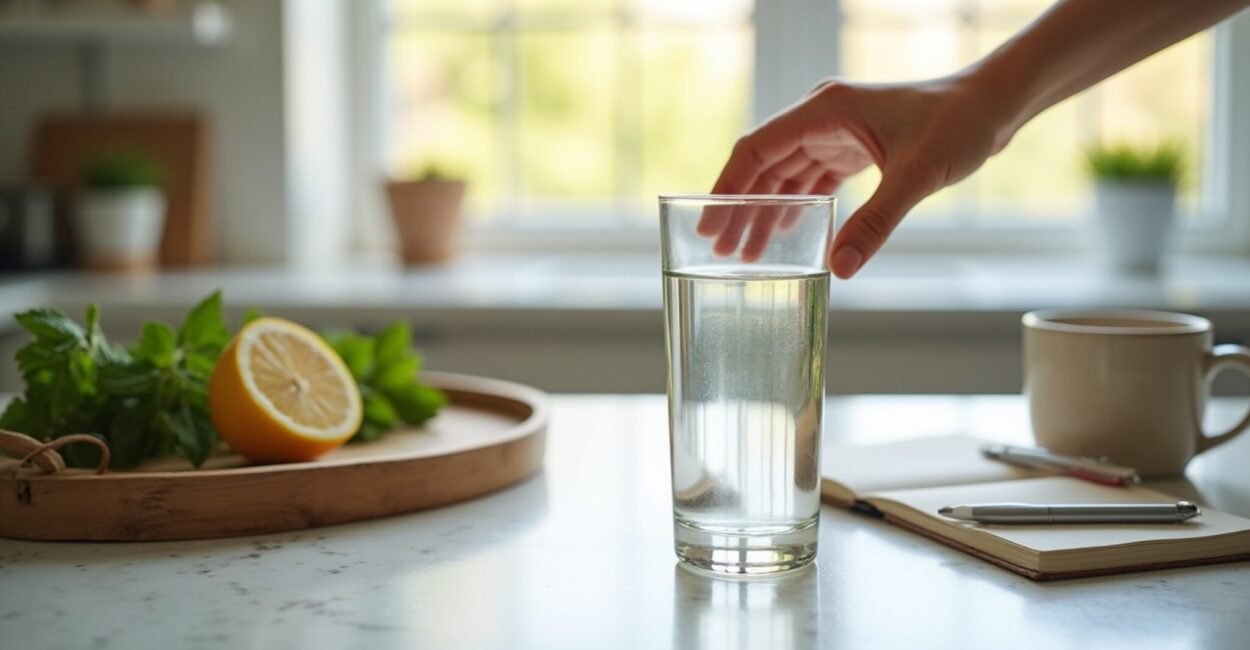Warning: Cannot modify header information - headers already sent in /home/u278635817/domains/mymorninglife.com/public_html/wp-content/plugins/artigosgpt/artigosgpt.php on line 29509
Warning: Cannot modify header information - headers already sent in /home/u278635817/domains/mymorninglife.com/public_html/wp-content/plugins/artigosgpt/artigosgpt.php on line 29509
Hydration is more than just a daily habit—it’s the foundation of vitality and wellness. Drinking water first thing in the morning kickstarts your body’s essential processes, setting the tone for energy, mental clarity, and overall health. If you’ve ever wondered why experts stress hydration, the answer lies in how water fuels every cell and system in your body.
In today’s fast-paced world, dehydration silently saps our strength and focus, making hydration an urgent priority. Understanding the profound benefits of morning hydration unveils a simple yet powerful ritual that can transform your day and well-being.
This article explores the science-backed importance of hydration, especially drinking water early, and reveals practical tips to boost your health and vitality through this essential practice.
Contents
ToggleWhy Hydration Matters: The Science Behind Water Intake
The Role of Water in the Body
Water makes up about 60% of the human body and is vital for nearly every function. It helps regulate temperature, lubricates joints, and supports digestion. Without adequate hydration, cells struggle to perform.
Hydration ensures that nutrients are transported efficiently and toxins are flushed out, maintaining internal balance and physical health.
Consequences of Dehydration
Even mild dehydration can impair cognitive function, mood, and energy levels. Chronic dehydration strains the kidneys and can lead to headaches and fatigue. It weakens the immune system, leaving the body vulnerable.
Understanding these risks highlights why consistent hydration, especially in the morning, is critical for sustained health.
Hydration and Metabolism
Water intake directly impacts metabolism and calorie burning. Proper hydration boosts metabolic rates and aids weight management by enhancing fat breakdown and energy production.
Drinking water first thing in the morning jumpstarts your metabolism and helps maintain a healthy weight.
The Power of Drinking Water First Thing in the Morning
Rehydrating After Sleep
After 6–8 hours without water, your body wakes up dehydrated. Drinking water immediately replenishes lost fluids and restores balance. This rehydration wakes up organs and kickstarts bodily functions.
It’s a natural way to reset your system and prepare your body for the day ahead.
Boosting Brain Function
Morning hydration stimulates brain activity, improving concentration, memory, and mood. Water fuels neurons and helps cognitive processes work smoothly. Dehydration can cause brain fog and sluggishness.
Starting your day hydrated means sharper thinking and better emotional resilience.
Enhancing Digestion and Detoxification
Water triggers digestive enzymes and promotes bowel movements. Drinking it first thing aids in flushing toxins and cleansing the digestive tract. This reduces bloating and supports gut health.
Hydration is a gentle yet effective detox method that enhances your body’s natural cleansing systems.
Health Benefits of Consistent Hydration
Improved Physical Performance
Hydration supports muscle function and endurance. During exercise, water prevents cramps and fatigue by regulating body temperature and maintaining electrolyte balance.
Consistent hydration promotes faster recovery and boosts athletic performance.
Skin Health and Appearance
Water hydrates skin from the inside, improving elasticity and reducing wrinkles. Adequate hydration flushes out impurities, leading to clearer, glowing skin.
Regular hydration is a natural beauty treatment that supports youthful skin.
Heart and Kidney Health
Proper hydration reduces the risk of kidney stones and urinary tract infections. Water helps maintain blood volume and pressure, supporting cardiovascular health.
Drinking enough water daily keeps your heart and kidneys functioning optimally.
How to Incorporate Hydration into Your Morning Routine
Choosing the Right Water
Opt for clean, filtered water to avoid contaminants. Some prefer adding lemon for flavor and added antioxidants. Temperature matters—room temperature water is gentle on the stomach.
Quality water enhances the benefits of your hydration ritual.
Timing and Quantity
Drink 16–20 ounces (about 500–600 ml) of water within 30 minutes of waking. This amount effectively rehydrates without overwhelming your system. Spread additional water intake throughout the morning.
Consistent timing builds a sustainable hydration habit.
Hydration Triggers and Habits
Set reminders or place a glass by your bedside to encourage morning hydration. Pair water drinking with other morning activities like stretching or meditation to reinforce the habit.
Creating triggers helps make hydration an automatic part of your routine.
Hydration and Mental Well-Being
Reducing Stress and Anxiety
Dehydration can increase cortisol levels, which heightens stress and anxiety. Staying hydrated supports balanced hormone levels, promoting calmness and emotional stability.
Morning hydration can be a small but powerful tool for mental wellness.
Enhancing Mood and Energy
Water boosts oxygen delivery to the brain, which elevates mood and energy levels. Dehydrated brains tend to feel sluggish and irritable. Starting hydrated sets a positive emotional tone.
This simple act can lift your spirits and sharpen your focus.
Supporting Cognitive Performance
Hydration improves memory, learning, and problem-solving abilities. It sustains neurotransmitter function and neural connectivity. Regular water intake is essential for long-term brain health.
Hydration is a natural enhancer of mental clarity and creativity.
Common Myths and Misconceptions About Hydration
“You Must Drink 8 Glasses a Day”
This general rule ignores individual needs. Hydration depends on body size, activity level, climate, and diet. Listening to thirst and monitoring urine color are better indicators.
Flexible hydration strategies are more effective than rigid rules.
“Coffee and Tea Don’t Count”
While caffeine is a mild diuretic, moderate coffee and tea consumption contributes to hydration. These beverages can be part of total fluid intake when consumed sensibly.
Understanding beverage effects helps optimize hydration without cutting out favorites.
“Drinking Water Flushes Fat”
Water doesn’t directly burn fat but supports metabolism and fat breakdown. It enhances the body’s ability to process nutrients and remove waste, indirectly aiding weight management.
Hydration complements, but doesn’t replace, diet and exercise.
Tools and Technologies to Track Your Hydration
Smart Water Bottles
These bottles track your daily water intake and remind you to drink. They sync with apps to provide hydration insights. Ideal for busy people needing extra motivation.
Smart bottles make hydration engaging and easy to monitor.
Mobile Apps and Wearables
Apps can log water consumption and offer personalized hydration goals. Wearables monitor sweat and hydration levels, providing real-time feedback. They help build consistent habits.
Technology empowers smarter hydration management.
Hydration Tracking Tips
Keep a water journal or use simple reminders. Track factors like weather and activity to adjust intake accordingly. Regular self-checks ensure you stay hydrated.
Awareness is key to maintaining optimal hydration daily.
| Hydration Benefit | Description | Recommended Morning Intake |
|---|---|---|
| Rehydration | Restores fluids lost overnight and resets body functions | 16–20 oz (500–600 ml) |
| Brain Boost | Improves focus, mood, and cognitive performance | 16–20 oz (500–600 ml) |
| Digestive Support | Stimulates digestion and detoxification processes | 16–20 oz (500–600 ml) |
Step-by-Step Guide to Morning Hydration
- Place a glass or bottle of water by your bedside before sleeping.
- Drink 16–20 ounces immediately upon waking.
- Optional: Add a slice of lemon or a pinch of sea salt for taste and minerals.
- Follow with light stretching or breathing exercises to awaken your body.
- Continue sipping water throughout the morning in small amounts.
- Adjust intake based on thirst, activity, and climate conditions.
Conclusion: Embrace Hydration for a Healthier You
Hydration is the simplest, most powerful tool to enhance your health, energy, and mood. Drinking water first thing in the morning recharges your body and mind, offering a fresh start every day. By making hydration a ritual, you unlock a natural source of vitality that supports your entire well-being.
Remember the quiet power of hydration you felt when reading this—now it’s time to experience it firsthand. Your body and mind will thank you.
Frequently Asked Questions
How much water should I drink first thing in the morning?
Experts recommend drinking between 16 to 20 ounces (approximately 500 to 600 ml) of water within 30 minutes of waking. This amount effectively replenishes fluids lost during sleep and jumpstarts your metabolism without overwhelming your system.
Can drinking water first thing improve digestion?
Yes, drinking water in the morning stimulates digestive enzymes and promotes bowel movements. This helps flush out toxins and supports healthy digestion, reducing bloating and discomfort throughout the day.
Is it better to drink cold or room temperature water for hydration?
Room temperature water is generally easier on the stomach and absorbs faster, making it ideal for morning hydration. Cold water can be refreshing but may cause temporary stomach discomfort for some people.
Does coffee count towards daily hydration?
Moderate coffee consumption does contribute to your daily fluid intake despite its mild diuretic effect. However, relying solely on caffeinated drinks is not advisable; plain water remains the best hydration source.
Can drinking too much water in the morning be harmful?
Drinking excessive amounts of water quickly can overwhelm your kidneys and lead to a condition called hyponatremia, where sodium levels in the blood become dangerously low. It’s best to drink moderate amounts and spread intake throughout the day.
For further reading on hydration, visit CDC’s Plain Water Facts and NHS Hydration Advice.
More Articles















Sponsored Content













